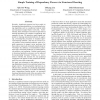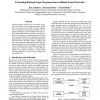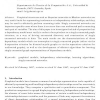123 search results - page 16 / 25 » Learning the structure of Markov logic networks |
IJCAI
2007
13 years 9 months ago
2007
Recently, significant progress has been made on learning structured predictors via coordinated training algorithms such as conditional random fields and maximum margin Markov ne...
APIN
2010
13 years 7 months ago
2010
Artificial neural networks can be trained to perform excellently in many application areas. While they can learn from raw data to solve sophisticated recognition and analysis prob...
ML
2006
ACM
13 years 7 months ago
2006
ACM
In this paper, we describe the syntax and semantics for a probabilistic relational language (PRL). PRL is a recasting of recent work in Probabilistic Relational Models (PRMs) into ...
JETAI
1998
13 years 7 months ago
1998
Graphical structures such as Bayesian networks or Markov networks are very useful tools for representing irrelevance or independency relationships, and they may be used to e cientl...
IJAR
2010
13 years 6 months ago
2010
The logical and algorithmic properties of stable conditional independence (CI) as an alternative structural representation of conditional independence information are investigated...



